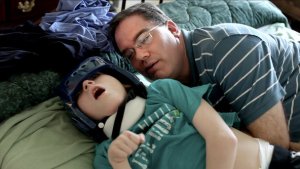I am often struck by the juxtaposition of the daunting challenges faced by the families we serve here at Northwest Center, on the one hand, and the deep human value that so often emerges from those challenges. This might be the central paradox of our work – that the challenges of developmental disability however unwelcome they may be often take people (sometimes kicking and screaming) to a deeper place in their lives, a place of rich meaning and beauty. And it is through diversity and inclusion in our schools, businesses, and communities that the rest of us can access this gift, this rich human experience that evokes qualities so desperately needed in this complex world of ours.
Did you see the article in the paper recently about the high school physics teacher in Louisville who devotes one class session each semester to exploring the “big questions” about life with his students? He tells them about his 12 year old son Adam who has Joubert syndrome, a developmental condition that affects balance and motor control and makes it impossible for him to speak. He tells the students about the day Adam was born, and how “all those dreams about ever watching my son knock a home run over the fence went away.” But one day he noticed Adam watching his older sister Abbie playing with dolls nearby and realized that Adam in fact has an inner life, an intelligence waiting to be expressed. They taught Adam sign language. Then one day Adam signed, “Daddy, I love you.”
The lesson to the class is unmistakable and trumps everything else the students have learned all semester about physics. “There is nothing more incredible than the day you see this,” he tells his students. “There is something a lot greater than energy. There’s something a lot greater than entropy,” he continues. “Somebody cares about you a lot. As long as we care about each other, that’s where we go from here.” Adam will never clear the bases in Little League or drive the lane for an easy hoop or graduate from Dartmouth. Yet somehow despite his challenges or perhaps because of them, this 12 year old boy has taken his father to a place of great meaning, love, and beauty.
We see this phenomenon repeated daily here at Northwest Center in our schools and businesses. Yet the dominant paradigm in our society treats developmental disabilities as problems to be solved, deficits to be overcome, or pathologies to be cured. This is what makes Northwest Center so unique, that we focus on ability and inherent value and the power of diversity to evoke the best qualities in everyone.
 But there is so much work to be done; we are only scratching the surface of what is possible. I met a mother recently whose highly talented son with autism recently graduated from high school. Despite his participation in a traditional School to Work job placement program, he did not have a job when he graduated. Under the brutal calculus of public funding mechanisms, this made him ineligible for job training, coaching, and placement services. That’s right, not having a job at graduation makes him ineligible for services that would help him get a job! So this beautiful gifted boy, in the words of his mother, “graduated into nothingness” and sits home playing video games.
But there is so much work to be done; we are only scratching the surface of what is possible. I met a mother recently whose highly talented son with autism recently graduated from high school. Despite his participation in a traditional School to Work job placement program, he did not have a job when he graduated. Under the brutal calculus of public funding mechanisms, this made him ineligible for job training, coaching, and placement services. That’s right, not having a job at graduation makes him ineligible for services that would help him get a job! So this beautiful gifted boy, in the words of his mother, “graduated into nothingness” and sits home playing video games.
This is our challenge – talented young people with so much to give, so much to teach, so much value to share and evoke in others, graduating into nothingness. With your help, Northwest Center will be working with great urgency this year to make its innovative School to Work and job placement programs available to more people like this young man. The world needs everyone; we can’t afford to leave value on the table.
